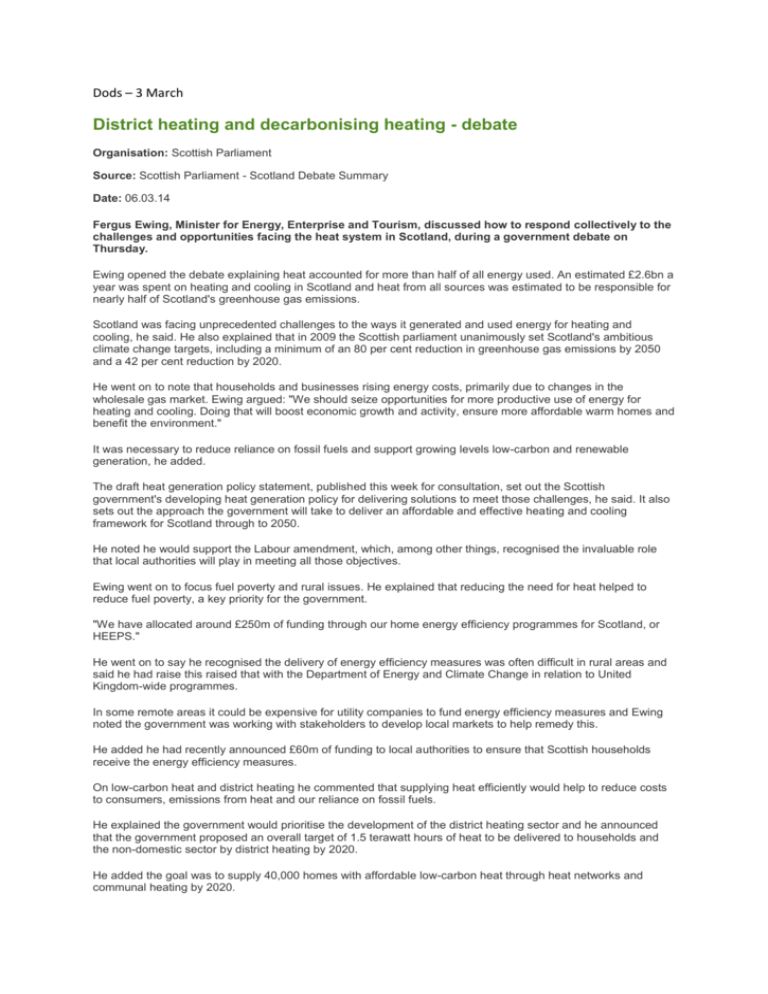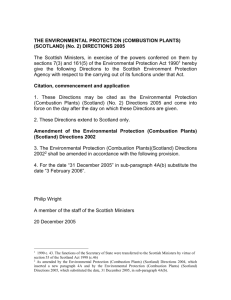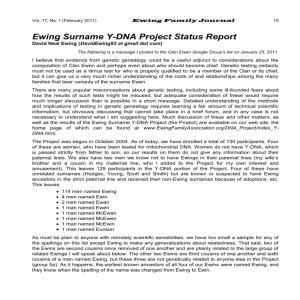Dods 3 Mar 2014
advertisement

Dods – 3 March District heating and decarbonising heating - debate Organisation: Scottish Parliament Source: Scottish Parliament - Scotland Debate Summary Date: 06.03.14 Fergus Ewing, Minister for Energy, Enterprise and Tourism, discussed how to respond collectively to the challenges and opportunities facing the heat system in Scotland, during a government debate on Thursday. Ewing opened the debate explaining heat accounted for more than half of all energy used. An estimated £2.6bn a year was spent on heating and cooling in Scotland and heat from all sources was estimated to be responsible for nearly half of Scotland's greenhouse gas emissions. Scotland was facing unprecedented challenges to the ways it generated and used energy for heating and cooling, he said. He also explained that in 2009 the Scottish parliament unanimously set Scotland's ambitious climate change targets, including a minimum of an 80 per cent reduction in greenhouse gas emissions by 2050 and a 42 per cent reduction by 2020. He went on to note that households and businesses rising energy costs, primarily due to changes in the wholesale gas market. Ewing argued: "We should seize opportunities for more productive use of energy for heating and cooling. Doing that will boost economic growth and activity, ensure more affordable warm homes and benefit the environment." It was necessary to reduce reliance on fossil fuels and support growing levels low-carbon and renewable generation, he added. The draft heat generation policy statement, published this week for consultation, set out the Scottish government's developing heat generation policy for delivering solutions to meet those challenges, he said. It also sets out the approach the government will take to deliver an affordable and effective heating and cooling framework for Scotland through to 2050. He noted he would support the Labour amendment, which, among other things, recognised the invaluable role that local authorities will play in meeting all those objectives. Ewing went on to focus fuel poverty and rural issues. He explained that reducing the need for heat helped to reduce fuel poverty, a key priority for the government. "We have allocated around £250m of funding through our home energy efficiency programmes for Scotland, or HEEPS." He went on to say he recognised the delivery of energy efficiency measures was often difficult in rural areas and said he had raise this raised that with the Department of Energy and Climate Change in relation to United Kingdom-wide programmes. In some remote areas it could be expensive for utility companies to fund energy efficiency measures and Ewing noted the government was working with stakeholders to develop local markets to help remedy this. He added he had recently announced £60m of funding to local authorities to ensure that Scottish households receive the energy efficiency measures. On low-carbon heat and district heating he commented that supplying heat efficiently would help to reduce costs to consumers, emissions from heat and our reliance on fossil fuels. He explained the government would prioritise the development of the district heating sector and he announced that the government proposed an overall target of 1.5 terawatt hours of heat to be delivered to households and the non-domestic sector by district heating by 2020. He added the goal was to supply 40,000 homes with affordable low-carbon heat through heat networks and communal heating by 2020. Ewing also said he was increasing funding for the district heating loans fund by more than £4m. He went on to talk more of the potential for renewable energy, saying there were opportunities for new sectors, such as the geothermal industry. Following a debate Ewing stressed that the draft heat generation policy statement was at the start of a consultation process. In response to a question on permitted development rights for air-source heat pumps, he explained the Scottish government introduced permitted development rights for many technologies, but not for air-source heat pumps, which had been due to noise concerns. Noting surprise at this Ewing suggested it could be looked at anew in the coming months. Ewing noted many members had raised the off-grid issue, "which is one of the most important issues of all." He explained that a substantial amount of resource and effort was directed towards helping to tackle fuel poverty in rural Scotland, especially off-gas-grid properties. He explained there were difficulties as, for example, there were often no cavities in the walls in which to put insulation. He added there were a range of practical problems and that much work had been carried out under the radar to provide solutions. The government had invested nearly £4.5m in an interest-free home renewables loan scheme, he explained. However he went on to say more needs to be done to highlight the opportunities and to make people aware of such schemes. Fuel poverty was most prevalent among consumers in off-gas-grid rural areas, he noted. He added there was another way to help to attack fuel poverty; "enormous onshore wind developments allow the prospect of equally enormous community benefit payments or, indeed, community ownership options." He accepted that such decisions should be made locally, rather than centrally. Amendment S4M-09239.2 agreed to. Amendment S4M-09239.1 agreed to. Motion, as amended, agreed to, That the Parliament notes the publication on 4 March 2014 of the Draft Heat Generation Policy Statement for public consultation; agrees with the statement's ambition to deliver an affordable low-carbon heating and cooling framework for Scotland through to 2050; recognises that the policy statement establishes a strong foundation for decarbonising the heat system, helping underpin climate change targets, while offering real economic opportunities for business and industry along with affordable warmth for households; recognises the success of projects such as Aberdeen Heat & Power, Shetland Heat Energy & Power, the Glasgow Commonwealth Games Village, Fife Council's Dunfermline District Heating Network, Ignis Wick and the many small-scale renewable district heating schemes in rural Scotland; encourages all interested parties to respond to the consultation; further recognises that, if Scotland is to meet its climate change targets, it must acknowledge climate justice commitments and should ensure that communities and households that are financially challenged are supported and not left in fuel poverty as heat is decarbonised; understands the necessity of the active involvement of local authorities and all public bodies in the process of decarbonising heating in domestic and non-domestic buildings, and agrees that there must be robust energy efficiency measures to support heat and decarbonisation, along with awareness raising of the ways in which demand reduction can be addressed; believes that reducing energy demand at a domestic level is key to cutting carbon emissions; notes the importance that insulation plays in the heat hierarchy; considers that well-funded energy efficiency and insulation schemes are an important way of encouraging householders to reduce their energy consumption while also saving households money on their energy bills; welcomes the introduction of smart meter technology, which can help households and small businesses to monitor and reduce energy usage; notes that more than 50 million smart meters will be introduced to 30 million homes and smaller non-domestic properties in the UK by 2020, and believes that improving energy efficiency at as local a level as possible can help meet climate change targets while transitioning to a zero-carbon Scotland. Meeting closed at 17:01. 06 March 2014 Heathrow Airport Organisation: Environment, Food and Rural Affairs Source: House of Commons - Commons Written Answers Date: 06.03.14 Adam Afriyie To ask the Secretary of State for Environment, Food and Rural Affairs what assessment he has made of the potential effect of expansion of Heathrow airport on flood reservoir capacity in (a) Berkshire, (b) Surrey and (c) the surrounding areas. [189708] Dan Rogerson Dan Rogerson:No assessment has been made as yet of the potential effects of any of the proposals set out in the Davies commission's interim report. However, DEFRA, the Environment Agency and Natural England have been represented on the commission's Sustainability Reference Group, which has supported the commission's work on the development of the appraisal methodology to be applied to the shortlisted options. This includes the need to assess key impacts, including on noise, air quality, biodiversity, water supply and flood risk, and is underpinned by an ecosystems services appraisal approach. The commission published the draft methodology for consultation and the final methodology will be published later in the year. The final assessment of the shortlisted options will be undertaken by the commission, independent of Government. HC Deb 06 March 2014 cc987- Energy and Climate Change Organisation: Energy and Climate Change Source: House of Commons - Commons Written Questions Tabled Date: 06.03.14 Roger Williams (Brecon and Radnorshire): What evidence his Department uses to determine the effect on local communities of noise, flicker and value reduction of property in relation to wind turbines. [190919] (For answer 11/03/2014) House of Lords Organisation: House of Lords Source: House of Lords - Lords written questions tabled Date: 04.03.14 Baroness Byford: To ask Her Majesty's Government whether they have made any assessment of the noise which may result from fracking; and if so, whether the noise will be audible at ground level and to what radius. [HL5758] (For answer 18/03/2014)








